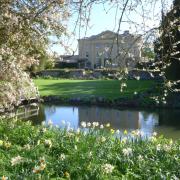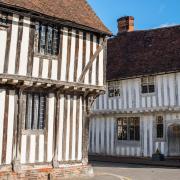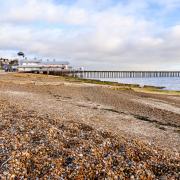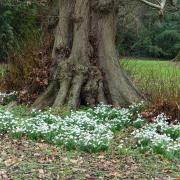Martin Chambers is on the road again, pulling strings with the guitar man

If you’re travelling down the A134 towards the deep south of Suffolk, you may think you’re imagining things when you hear the unmistakeable grind of glass on wire, that Delta Blues slide guitar sound. It’s not Seasick Steve, and it ain’t Jack White. It’ll likely be Mark Ellis tuning up his Nineboys’ Suffolk-made guitar selection, giving them that blues something.
Mark is a long-time player in the musical instrument business, having worked for Rosetti at Braintree for 17 years. But a staff cull saw Mark branch out on his own. He started by designing guitars and having them manufactured in Indonesia. As he says: “They are great guitars with great specification, and the competition also has great guitars with great specs and a lot of the time they are coming out of exactly the same factory. So there was nothing different.”
That homogeneity, that sameness, was what drove Mark to look for something different. Recession had hit the guitar industry, leaving only six or seven guitar factories in the world. If you go into a shop it is more than likely the guitars will have come from one of those.
There’s a documentary called It Might Get Loud (you can find the whole film on YouTube) with guitar legends Jimmy Page, The Edge and Jack White talking about their influences, how they came about their kit, and insights into how they play their instruments. This had a profound effect on Mark Ellis, the man behind Nineboys and creator of fantastic blues instruments. I’ll let him tell the story.

“At the beginning of the film Jack White makes up a diddley bow out of a rough bit of wood flooring, a Pepsi bottle and a pick up, so I tried it myself, and showed a friend who wanted to buy it. So there I was, struggling to sell a range of acoustic guitars, and I’d made one with a rough bit of wood and a bottle – and I’d made a sale within minutes.
“I’d made it out of a flat bit of wood, but when you put a string on it and tune it to pitch it’s actually about two stone of tension, so it literally bowed the wood and it wasn’t good enough.
“A local guy who’s an engineer came up with the idea of the wedge shape. I spoke to AJ Joinery who are just down the road from us and it turned out to be a good suit for them, because all the roof trusses they don’t use, effectively they have to pay for disposal. To them it was intriguing. They could actually use some of their offcuts.”
Mark picks up a Tabasco sauce bottle to use as a slide, creating some hot blues sounds on his Nineboys wedge.
AJ Joinery cuts the shape, so what Mark does is brand and lacquer it and add the bits screwed to it.
“Our products are totally sustainable as well,” says Mark. “I didn’t choose to have some hippy vision about creating a sustainable product, it just happens to be a side part of it.”
Mark sent diddley bow wedges to a guitar specialist and some artists. It became clear he was striking a chord.
“The original diddley bow was created by black Americans in the deep south. Taking a bit of broom wire from the broom stick, they hammered it on to the wall of their shed and ran a whisky bottle up and down it playing the diddley bow on the side of their house. All the great deep south blues players like Muddy Waters would have started on a diddley bow and then progressed to a three stringed instrument, like the cigar box – which we make as well.
“I remember going out to my first major retailer with the diddley bow and I was sitting in the car thinking, ‘he’s just going to laugh me out of the shop. This is just ridiculous.’ And I walked in with this thing and got it out, and he looked at me, and he did laugh, but the guys that were working for him were like ‘I’ve got to have a go on that’.
“And they’re all talking about It Might Get Loud and Seasick Steve and ‘I need to buy it’.
“It’s an immediate talking point. They do fall about laughing – and why wouldn’t they? It’s a baked bean can and a lump of wood.
“Part of the selling process is the lightheartedness of it. You can guarantee them that this will be their biggest selling one-string guitar this year. It’s a bit of fun, but it does make a great sound.”
Nineboys’ guitars can be found online at nineboys.co.uk, and for real at Balaams in Bury St Edmunds, Compact Music in Sudbury and West End Music in Ipswich.
All Mark wanted to do was to make a proper little acoustic guitar, a sustainable product made in Suffolk. And he’s achieved that.
“The original Nineboys guitars were what you call full size. The market has changed significantly, mainly because of Ed Sheeran. He plays a smaller guitar.
“The kids wanted old, tatty, beaten up guitars, which is why I started coming up with my aged ones.
“I looked at how my guitars were put together and whether I could do it in the UK. I came across Wup Doodle at Hepworth, one of the leaders nationwide in problem solving in wood.
“It was lucky I came across them. There are so many engineering companies in Suffolk – we’re quite spoilt round here. You don’t think of Suffolk as cutting-edge in engineering.
“So what they did was take a piece of wood and a computer aided routing machine and rout out everything but the bracing. I end up with back, top and sides and a neck, and a truss as well, made from birch from Latvia, chosen for the weight.
Mark’s registered the old American brand name of Tonk Brothers for his range of ‘trashed’ guitars, which have just come on the market, targeting those that want the history. They are given the ‘old’ look by sanding down the almost dry lacquer.
“The whole idea is that it looks like something that has been in a fire, fallen apart, battered,” says Mark. The trashed black is the one that is getting the most interest. If you imagine an old blues guy sitting on a porch, what sort of guitar would be resting on the side of it?”



























